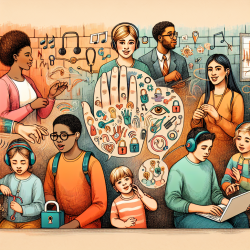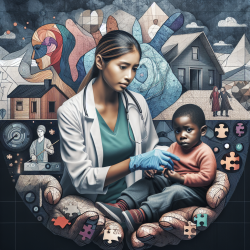In the realm of special education, professionals continually seek ways to improve their practices and better support their students. One valuable resource is the book "The Young Deaf Child" (1999) by David M. Luterman, Ellen Kurtzer-White, and Richard Seewald. This text offers a wealth of knowledge for those working with young children newly identified with hearing loss. The insights from this book can significantly enhance a practitioner's ability to provide effective, parent-centered care.
Here are some key takeaways from "The Young Deaf Child" that can be implemented to improve practice:
- Early Detection and Intervention: The book emphasizes the importance of early detection of hearing loss and immediate intervention. Practitioners should advocate for universal newborn hearing screening and ensure that early intervention services are readily accessible. Early detection and intervention can significantly impact a child's language development and overall quality of life.
- Parent-Centered Care: A recurring theme in the book is the need for truly parent-centered care. This involves actively listening to parents' concerns, providing them with comprehensive information about their child's condition, and involving them in the decision-making process. Practitioners should foster open communication and build strong partnerships with parents to support the child's development effectively.
- Holistic Approach to Therapy: The book advocates for a holistic approach to therapy that considers the child's overall well-being, including emotional and social development. Practitioners should collaborate with a multidisciplinary team to address all aspects of the child's needs. This might include working with speech-language pathologists, audiologists, psychologists, and other specialists.
- Assistive Hearing Technologies: The text provides valuable insights into the use of assistive hearing technologies, such as hearing aids and cochlear implants. Practitioners should stay informed about the latest advancements in hearing technology and ensure that children have access to the most appropriate devices for their needs. Additionally, they should provide ongoing support and training for both the child and their family in using these technologies effectively.
- Counseling and Support: The book highlights the importance of counseling and emotional support for both the child and their family. Practitioners should be prepared to address the emotional challenges that come with a diagnosis of hearing loss and provide resources for coping and support. This might include connecting families with support groups or providing referrals to mental health professionals.
For practitioners looking to delve deeper into the subject, further research and continuous professional development are essential. Attending conferences, reading relevant publications, and participating in webinars can provide additional insights and keep practitioners up-to-date with the latest best practices in the field.
To read the original research paper, please follow this link: The Young Deaf Child (1999)










